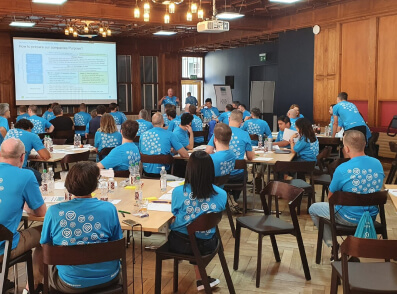Globally, cancer is the second leading cause of death, with estimates declaring that 1 in 6 deaths occurs due to cancer. The widespread disease is not only costing us many lives globally, but it also comes with an expensive price tag for our economy.
The global annual economic cost of cancer in 2010 was estimated at approximately US$ 1.16 trillion.
So, as we highlight the importance of World Cancer Day on February 4th, it is crucial to address some of the main causes of cancer around the world: modifiable lifestyle factors. These include having a high body mass index, lack of physical activity, having an unhealthy diet, tobacco use, and alcohol consumption.
The good news is that insurers are now able to shift from a payor-only perspective to a proactive prevention partner who truly cares about their members and wants to improve their health outcomes. Read on to find out how.
Insurance As A Prevention Service
Life & Health insurers should have a strong interest in preventing cancer among their insured members. Treating any kind of cancer is costly and long-lasting, and those who have suffered from cancer once are likely to develop it again. This is mostly due to the consequences of cancer treatments, such as radiotherapy and chemotherapy, which damage the fast-growing cancer cells but can also damage healthy cells in our bodies, increasing the risk of making them malignant over time.
With one in three cancer deaths being attributed directly to behavioral or lifestyle factors, this is a great opportunity for insurers to encourage healthy habits among their policyholders.
As previously mentioned, there is some serious prevention work to be done. Insurers should realize and emphasize among their members the importance of the below key lifestyle factors that raise the risk of developing cancer. These are not only major cancer risk factors worldwide but are also the four shared risk factors for other noncommunicable diseases (NCDs).
- A high body mass index. Being overweight or obese poses huge risks to overall health. It increases the risk of certain health problems like heart disease, stroke, diabetes, gallbladder disease, sleep apnea and osteoarthritis. But alarmingly, obesity is also linked with a higher risk of developing certain cancers, such as esophageal, pancreatic, colorectal, breast, endometrial and kidney cancer. Insurers should encourage their members to stay a healthy weight throughout their lives, as it is associated with decreased risks of cancer.
- Tobacco use. Tobacco smoke has at least 70 chemicals that cause cancer, also known as carcinogens. These chemicals are distributed to all parts of the body and have the potential to change our cell’s DNA, producing cancerous cells as a result. Cancers associated with tobacco use are not only those which appear in the mouth or lungs. Tobacco users are more prone to develop cancers pretty much anywhere in the body. By now, the huge risks of using any kind of tobacco or nicotine product are well known, even among smokers.
However, quitting tobacco is something a lot of users will struggle with. Insurers should recognize this issue and provide an easy and relevant way to help users quit smoking. - Alcohol consumption. Drinking alcohol increases the risk of the person developing cancers of the mouth, liver, esophagus, colon and rectum or breast. This is because when we drink alcohol, our body breaks it down into a chemical called acetaldehyde. Acetaldehyde damages our DNA and prevents our body from repairing the damage, so these damaged cells could become cancerous. Insurers would benefit from informing their members in a relevant and personalized manner about the risks associated with alcohol use and help them take the lead in either avoiding it or drinking only in moderation.
- An unhealthy diet. As we mentioned in a previous blog, food can really be our best medicine.
Did you know that healthier diets could prevent around 1 in 20 cancers?
A healthy diet comprised of mostly wholefoods and plant-based items, can be beneficial in reducing our cancer risk. It is specially recommended to increase the amount of fiber intake and reduce the amount of processed or red meats. It is of paramount importance that insured members adopt healthy eating habits as they not only decrease the risks of developing cancer but also provide many other health benefits.
- Physical inactivity. Evidence shows that physical activity is linked to decreased risks of certain cancers, as well as improved outcomes for cancer survivors. Similarly, as the forementioned concepts, being physically active not only helps lower our chances of developing cancers but also has innumerable other health benefits.
Well, as a Life or Health insurer, it may seem a little overwhelming to implement a dedicated solution to address each of these topics and provide a way for your insured members to be aware of them. However, with our Digital Health Engagement Platform (Wheel of LifeTM) you will provide your insured members with a holistic solution to measure and improve their overall health.
Talk to us today to find out how we are helping combat poor lifestyle behaviors globally, through partnerships with leading insurers.
Join our #wecare strategy and become more than just a payor. Make a difference, truly.















